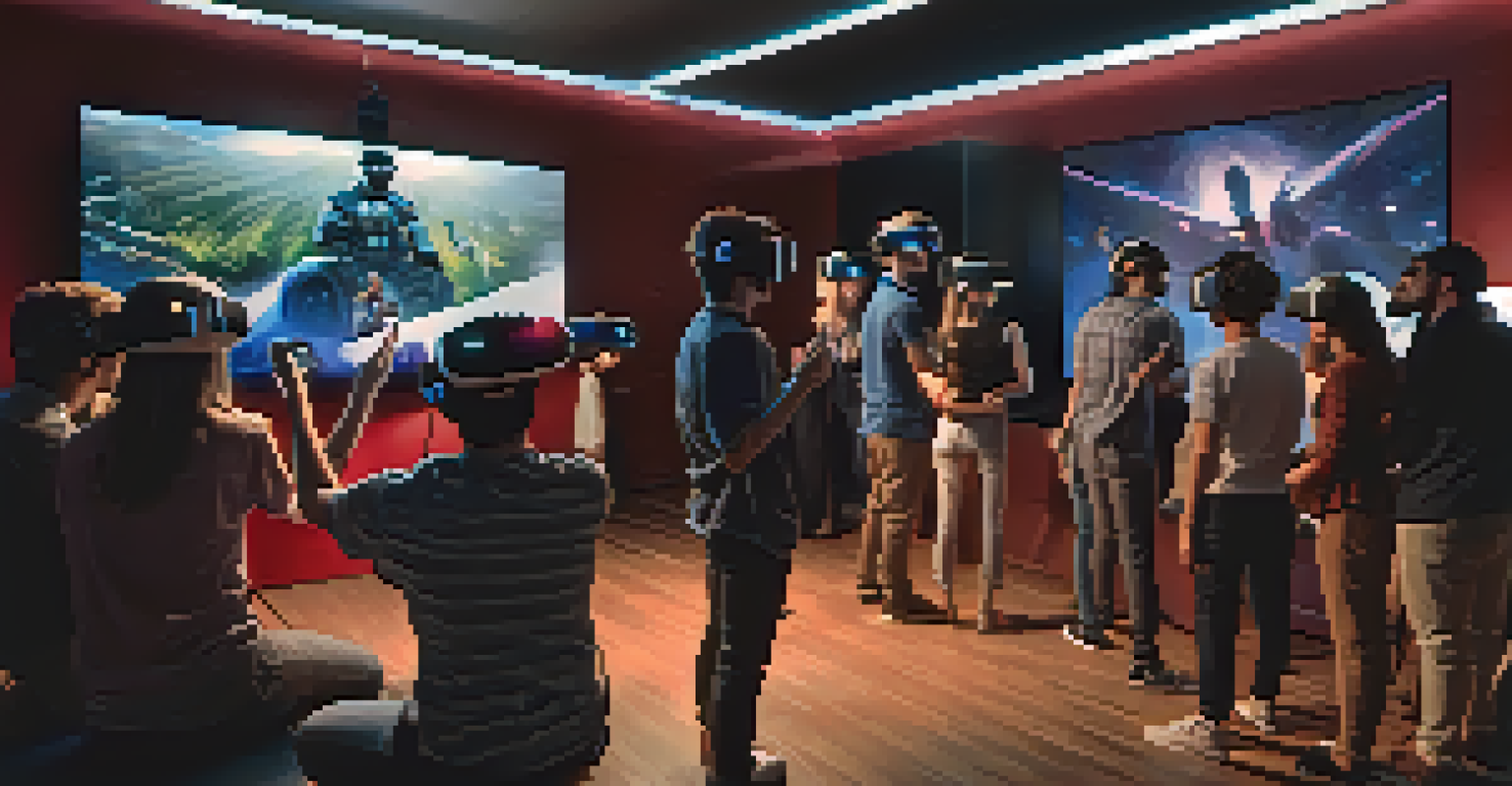The Evolution of Film Marketing in the Digital Age

The Shift from Traditional to Digital Marketing Strategies
In the past, film marketing relied heavily on traditional media like print ads, billboards, and TV spots. These methods, while effective, often had a limited reach and could be costly, leading studios to invest heavily in big-budget campaigns. However, the rise of digital platforms has shifted the focus toward more cost-effective and targeted strategies that engage audiences directly.
The best marketing doesn't feel like marketing.
Today, filmmakers can leverage social media, email campaigns, and targeted online ads to create buzz around their films. This shift allows for a more interactive relationship with potential viewers, fostering communities around films before they even hit the theaters. The accessibility of digital marketing channels means that even smaller independent films can compete for audience attention.
Moreover, data analytics now play a crucial role in shaping marketing campaigns. By analyzing viewer habits and preferences, marketers can tailor their strategies to resonate more deeply with specific demographics, ensuring that the right message reaches the right audience at the right time.
Social Media's Role in Film Promotion
Social media has revolutionized how films are promoted, providing platforms for direct engagement with fans. From teaser trailers to behind-the-scenes content, filmmakers can share exclusive material that builds excitement and anticipation. This level of access creates a sense of intimacy between the audience and the film, making them feel like part of the journey.

Additionally, social media allows for viral marketing opportunities that can catapult a film into the spotlight. When fans share content, it reaches their networks, creating a ripple effect that traditional marketing could only dream of. A single tweet or meme can generate massive interest, leading to increased ticket sales and greater audience turnout.
Digital Marketing Revolutionizes Film
The shift from traditional marketing to digital strategies allows filmmakers to engage audiences directly and cost-effectively.
However, the challenge lies in maintaining authenticity. Audiences are savvy and can quickly spot insincerity. Filmmakers need to ensure that their social media presence feels genuine and relatable, which is essential for building lasting connections with their audience.
The Impact of Influencer Marketing on Film
Influencer marketing has emerged as a powerful tool in the film industry, where popular social media figures can sway public opinion. By partnering with influencers who align with their film's themes, marketers can tap into established fan bases and reach new audiences. This method capitalizes on the trust that influencers have built with their followers, making their endorsements particularly impactful.
Data beats emotions.
For instance, a horror film might collaborate with a popular YouTube channel that specializes in scary content, effectively targeting the right audience. This strategy not only boosts visibility but also generates authentic conversations around the film. Fans are more likely to engage with content that feels organic rather than overtly promotional.
However, as the landscape evolves, filmmakers must choose their influencer partners wisely. The key is ensuring that the influencer's values align with the film's message to maintain credibility, which ultimately strengthens the marketing campaign.
The Use of Trailers and Teasers in Digital Marketing
Trailers and teasers have always been a staple of film marketing, but their role has transformed in the digital age. With platforms like YouTube and social media, filmmakers can release multiple versions of trailers, catering to different audience segments and maximizing engagement. This allows for a more dynamic approach to capturing audience interest.
Moreover, the timing of trailer releases has become more strategic. Marketers often release trailers during significant events or moments in pop culture to generate buzz. For example, a highly anticipated trailer might drop during the Super Bowl, ensuring millions of eyes are on it, leading to immediate conversations across social media.
Social Media Boosts Film Engagement
Social media provides filmmakers with tools to connect with fans, create buzz, and promote films through viral marketing.
Interactive trailers are also on the rise, offering audiences a unique experience. These trailers allow viewers to explore different storylines or characters, creating a more personalized connection with the film. This innovation not only boosts interest but also encourages audiences to share their experiences with others.
The Role of Virtual Reality and Augmented Reality
As technology advances, virtual reality (VR) and augmented reality (AR) are becoming exciting tools for film marketing. These technologies allow filmmakers to create immersive experiences that can captivate audiences in unprecedented ways. Imagine stepping into a scene from a movie or interacting with characters through your smartphone—these experiences can create a deeper emotional connection with the film.
For example, a VR experience might let fans explore a film's universe, providing a taste of what to expect before its release. This not only builds anticipation but also encourages fans to share their experiences online, generating organic buzz. The unique nature of these technologies means they can create memorable marketing moments that traditional methods simply can't match.
However, implementing VR and AR requires a thoughtful approach. Marketers need to ensure that these experiences align with the film's themes and resonate with the target audience. When done right, they can become a powerful part of a film's marketing strategy.
The Importance of Data Analytics in Film Marketing
Data analytics has become a cornerstone of modern film marketing, allowing studios to make informed decisions based on audience behavior. By analyzing trends, preferences, and viewing habits, marketers can tailor their campaigns to maximize engagement and ticket sales. This data-driven approach helps in understanding what resonates with audiences, paving the way for more effective strategies.
Furthermore, analytics can help identify potential issues before they escalate. For example, if early trailers receive mixed reactions, studios can adjust their marketing efforts to address audience concerns. This agility is crucial in a fast-paced digital landscape where perceptions can change overnight.
Data Analytics Enhances Strategies
Leveraging data analytics helps studios tailor marketing efforts, ensuring campaigns resonate with specific audience segments.
Ultimately, leveraging data analytics not only improves marketing efficacy but also enhances the overall film experience. By understanding audience expectations, filmmakers can create content that resonates on a deeper level, leading to a more satisfied and engaged fanbase.
The Future of Film Marketing in a Digital World
Looking ahead, film marketing will continue to evolve alongside technological advancements. As new platforms and tools emerge, marketers will need to stay agile and adapt their strategies to harness these opportunities. Innovations like AI-driven marketing and personalized content delivery are likely to shape the future landscape.
Moreover, as audiences become more discerning, authenticity will remain paramount. Filmmakers and marketers must prioritize genuine connections with their audience, ensuring that their campaigns reflect the values and themes of their films. This focus on authenticity will be key to building lasting relationships with viewers.

In conclusion, the digital age has transformed film marketing from traditional methods to innovative strategies that engage audiences in meaningful ways. As technology continues to develop, filmmakers will have the unique opportunity to connect with audiences like never before, ensuring that the magic of cinema remains alive and well.